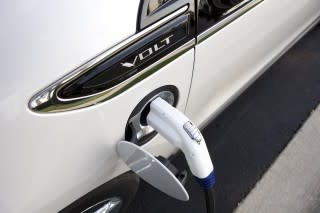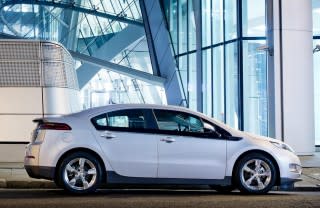Should I Buy A Used Chevy Volt Electric Car?
The Chevrolet Volt range-extended electric car scores higher on owner satisfaction than any other vehicle GM has sold since it began surveying its buyers.
It has attracted new buyers who'd never otherwise has considered a Chevy.
And GM data reveals that 80 percent of all Volt trips, and two-third of all Volt miles, are covered on battery charge provided by the electric grid--despite its seemingly low electric range of 35 or 38 miles.
In other words, the Volt is the electric car that gives you almost all electric running but none of the range anxiety of running out of charge.
DON'T MISS: Should I Buy A Used Nissan Leaf (Or Another Electric Car)?
That's because its 1.4-liter engine switches on when the battery gets low to recharge it enough so the car continues to drive for more than 300 miles.
Gas it up, and you can do the same again.
That's a great concept; it's also extremely hard to explain, advertise, and market--and to date, GM hasn't done a very good job at any of that.
As it enters the used-car market, the Volt appears to be a high-quality and reliable option for those who want to drive electric most of the time but need the assurance that, if required, they can knock out 250 miles at a stretch.

The first-generation Chevy Volt went on sale in December 2010, and lasted five model years.
Total production was likely around 100,000 units, when you include Volts sold in Canada and other markets--including its Opel/Vauxhall Ampera siblings (now discontinued).
An all-new 2016 Chevrolet Volt goes on sale next month in California, with 53 miles of range and a 41-mpg combined gas mileage rating when operating on engine power.
The first-generation Volt is an aerodynamic five-door, four-seat compact hatchback. Its rear seats are tight, with the T-shaped lithium-ion battery pack fitted down the tunnel and under the rear seats.
ALSO SEE: 2011 Chevrolet Volt Vs 2011 Nissan Leaf: 7,000 Miles Later (Jun 2011)
The Volt is about the size of its compact sibling the Chevrolet Cruze compact sedan, but the range-extended electric Volt successfully aimed at an entirely different market.
What should you know when starting to consider buying a used Chevy Volt?
PRICE
The asking price for a used Chevy Volt will vary greatly, depending on whether it's being sold privately or by a dealer. Of course age, mileage, and battery condition will play a role too.
Unlike the Nissan Leaf, however, Chevy Volts so far have shown virtually no evidence of notable battery degradation.

In general, cars bought from individuals will be lower-priced than those offered at dealerships, for whom selling used cars is generally more profitable than selling new cars.
We've heard reports of the oldest Volts (from the 2011 and 2012 model years) now offered at prices as low as $15,000, but most seem to be in the $18,000-and-up range.
Used Leafs, on the other hand, are now frequently offered for as little as $9,000--meaning the Volt definitely holds its value better.
MORE: Four Electric Cars To Avoid Buying Used
You can sort through used Volt listings on The Car Connection and other sites to get a sense for what's available near you.
Remember that the new 2016 Chevrolet Volt, which goes on sale in California next month, starts at about $33,500--but that's for the base model. High-end and heavily optioned models will carry sticker prices of more than $40,000.
Finally, Chevrolet dealers offer used Volts through the brand's Certified Used vehicle program.

While prices will again be higher than those bought from individuals, such programs add a measure of reassurance for those who prefer to buy used cars that have been carefully checked over by the dealer to ensure they meet Chevrolet's strict guidelines.
BATTERY LIFE
Anyone who uses a cellphone or a laptop computer knows that batteries degrade over time.
So it's entirely logical to ask whether the same has started to happen with the liquid-cooled lithium-ion battery pack in a used Chevy Volt.
Let's be very clear: Your phone battery can be trashed in a year or two--and that is NOT the case with an electric car.

First, all electric-car batteries are warranted against total failure for either 8 years/100,000 miles or 10 years/150,000 miles, depending on what state you live in.
Second, unlike the battery in a Nissan Leaf, the Volt is designed with a liquid heating and cooling system to keep the temperatures within a specific range.
That counters the excess heat that can notably shorten the life of battery cells.The Nisan Leaf, on the other hand, uses only passive air cooling.
That design decision has already led to a handful of reports of significant Leaf battery degradation in extremely hot climates like Arizona. The Volt had no similar reports.
The price for a replacement Volt battery pack hasn't been released, as far as we know, but the need for one is likely to be so rare that potential buyers probably don't need to worry about it.

DEPRECIATION
It's now relatively public that used electric cars have significantly higher depreciation than their gasoline counterparts.
So it's reasonable to ask, "Why did they lose their value so quickly?"
It's due to at least two factors. First is unfamiliarity: With less than five years of history, buyers just don't know how a used Volt will fare when it's 10 or 12 years old.

Second, however, is a financial quirk. Buying a plug-in electric car with a battery pack of 16 kilowatt-hours or more, including the Chevrolet Volt,can qualify you for a Federal income-tax credit of $7,500.
RELATED: Used Electric Cars: Which Hold Their Value Best? Which Is Worst?
In other words, that Volt's first owner likely paid $7,500 less than the sticker price once he or she took the credit. That applies whether the owner was an individual or a leasing company.
Re-run the depreciation numbers using the "effective price after incentives"--California and other states have their own incentives on top of the Federal credit--and the numbers don't look nearly so bad.
And the numbers for the Chevy Volt are better than those for the Nissan Leaf after both are adjusted.

In almost any area of the country, there will be a prevailing minimum value for any used car of any age that runs decently. it's possible that the second owner will find a Volt depreciating less than the first, who incurred that higher depreciation.
MODEL-YEAR DIFFERENCES
The first thing to know about used Volts is that over the five years of production, there were three different battery-pack capacities.
The pack was released for 2011 at 16.0 kilowatt-hours, and this pack was used in 2012 Volts as well. It was enlarged to 16.5 kWh in 2013 and 2014 Volts, and then again to 17.1 kWh for a single model year, 2015.
The 2011 and 2012 Volts were rated at 35 miles of electric range, with an efficiency of 94 MPGe in electric mode. (Miles Per Gallon Equivalent measures how far an electric car can travel on the same energy as contained in 1 gallon of gasoline.)

When running on its range-extending 1.4-liter four-cylinder engine, the 2011 and 2012 Volts were rated at 37 miles per gallon combined--at that time, better than any non-hybrid vehicle on the market.

 Yahoo Autos
Yahoo Autos 
